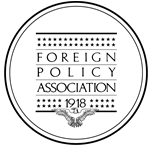League of Free Nations Association
The FPA was founded in 1918 as the "League of Free Nations Association." Under the chairmanship of journalist Paul Underwood Kellogg, it was formed by 41 Americans to support US President Woodrow Wilson's efforts to achieve a "just peace", with his speech and proposal of the Fourteen Points, which included the idea of a world organization, later to be called the League of Nations. Although the League of Nations ultimately failed, it did help pave the way for the success of the United Nations. The FPA also sought to increase support for United States membership in the world body that was then being discussed and laid out in the Versailles Treaty and the Paris Peace Conference, 1919, with the "Big Four" representatives dominating the many representatives of the nations formerly at war: President Woodrow Wilson of the US, Prime Minister David Lloyd George of the United Kingdom, Premier Georges Clemenceau of France, and Prime Minister Vittorio Emanuele Orlando of Italy following the Armistice ending combat in World War I. It also included future influential Americans from both major political parties, John Foster Dulles and Eleanor Roosevelt.
The United States Senate refused to ratify the Treaty of Versailles and membership of the League of Nations during various debate sessions with votes taken in 1919 and early 1920. Later following the election Republican President Warren G. Harding in the Presidential Election of 1920, the prospect of the US joining the League of Nations vanished. The League of Free Nations Association launched a bulletin in 1920. In 1921 the organisation changed its name to the Foreign Policy Association, and renamed its bulletin the News Bulletin of the Foreign Policy Association. [5]
Foreign Policy Association
In 1938, a series of lectures on foreign policy aimed towards women called "Off the Record" was launched under the support of the FPA, which later became a non-profit organization of its own in 1938, and now has more than 400 members as of 2023. [6]
In the 1940s, headed by Vera Micheles Dean, the FPA was broadcasting New York City meetings and weekly talks on the program "The World Today" over the National Broadcasting Company's (NBC) radio network. Later, as the discussions among citizens spread, the FPA branches across America began to grow in notoriety and became the forerunners of the various independent membership councils with the World Affairs Councils of America and the foreign affairs or foreign policy councils founded in major large cities or regions of states in the 1950s and 1960s, and some as late as the 1980s.
The FPA's publications, "Foreign Policy Reports" (1925–1951), "Foreign Policy Bulletin" (1920–1961) and "Headline Series" (1935–present) provide analysis of foreign policy issues.
In 1954, the FPAs launched its Great Decisions public education program on international affairs. [7] In the 1960s, the forerunner of the FPA's "Citizen's Guide to U.S. Foreign Policy" was published.
In the 1970s, Great Decisions opinion ballots were tabulated nationally for the first time. [8]
The Foreign Policy Association celebrated its 100th anniversary at a gala held at the Metropolitan Museum of Art in October 2018. [9]
